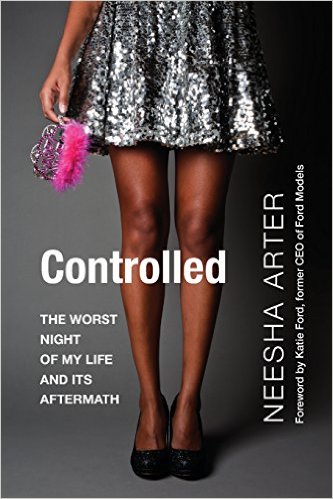Read About A College Author Using Her Writing To Break the Silence Around Sexual Assault And Eating Disorders
Requests: 0
Views: 31
Neesha Arter is raising her voice and speaking out about an issue that is too often left out of the discussion—the correlation between sexual assault and eating disorders. Speaking at The George Washington University during NEDAwareness Week, Neesha read excerpts from her memoir Controlled, sharing the connection between her sexual assault and her anorexia.
 Read "Controlled" by Neesha Arter
“My biggest question I had for myself was, ‘am I a 14 year old kid, or am I an adult?’ I told myself I had to choose,” Arter said, “and that was when I started to try to morph back into what I was before, to protect myself.”
Neesha’s story is one that too many people can relate to, but it’s also a story we rarely see. Looking for information on the connection between sexual assault and eating disorders, one could assume the two exist in separate realms. Sexual assault is frequently mentioned in isolation, and stories of eating disorder recovery are still trying to break free from stereotypes that the illnesses are based in vanity. In Controlled, Neesha shares her story, connecting the impact of rape and the development of an eating disorder...
In Controlled, Neesha shares her story, connecting the impact of rape and the development of an eating disorder. She adds her voice to an all-too-empty discussion about these issues, something she realizes is significant.
“I think it’s important to share my story because not enough people do,” Neesha said. “These are topics that have such stigma and they’re not openly discussed—they’re pretty taboo.”
To continue reading this piece from our partner, Proud2BMe, click here.
Read "Controlled" by Neesha Arter
“My biggest question I had for myself was, ‘am I a 14 year old kid, or am I an adult?’ I told myself I had to choose,” Arter said, “and that was when I started to try to morph back into what I was before, to protect myself.”
Neesha’s story is one that too many people can relate to, but it’s also a story we rarely see. Looking for information on the connection between sexual assault and eating disorders, one could assume the two exist in separate realms. Sexual assault is frequently mentioned in isolation, and stories of eating disorder recovery are still trying to break free from stereotypes that the illnesses are based in vanity. In Controlled, Neesha shares her story, connecting the impact of rape and the development of an eating disorder...
In Controlled, Neesha shares her story, connecting the impact of rape and the development of an eating disorder. She adds her voice to an all-too-empty discussion about these issues, something she realizes is significant.
“I think it’s important to share my story because not enough people do,” Neesha said. “These are topics that have such stigma and they’re not openly discussed—they’re pretty taboo.”
To continue reading this piece from our partner, Proud2BMe, click here.
Trigger warning: Descriptions of eating disordered behavior and sexual assault.
At just 14 years old, Neesha was sexually assaulted and struggled—as many do—to cope with the aftermath of such a violation. As she tried to find a way to regain some semblance of control of her body, Neesha developed anorexia. The eating disorder became a tool for survival and an attempt to “undo” the hurt she endured. Read "Controlled" by Neesha Arter
“My biggest question I had for myself was, ‘am I a 14 year old kid, or am I an adult?’ I told myself I had to choose,” Arter said, “and that was when I started to try to morph back into what I was before, to protect myself.”
Neesha’s story is one that too many people can relate to, but it’s also a story we rarely see. Looking for information on the connection between sexual assault and eating disorders, one could assume the two exist in separate realms. Sexual assault is frequently mentioned in isolation, and stories of eating disorder recovery are still trying to break free from stereotypes that the illnesses are based in vanity. In Controlled, Neesha shares her story, connecting the impact of rape and the development of an eating disorder...
In Controlled, Neesha shares her story, connecting the impact of rape and the development of an eating disorder. She adds her voice to an all-too-empty discussion about these issues, something she realizes is significant.
“I think it’s important to share my story because not enough people do,” Neesha said. “These are topics that have such stigma and they’re not openly discussed—they’re pretty taboo.”
To continue reading this piece from our partner, Proud2BMe, click here.
Read "Controlled" by Neesha Arter
“My biggest question I had for myself was, ‘am I a 14 year old kid, or am I an adult?’ I told myself I had to choose,” Arter said, “and that was when I started to try to morph back into what I was before, to protect myself.”
Neesha’s story is one that too many people can relate to, but it’s also a story we rarely see. Looking for information on the connection between sexual assault and eating disorders, one could assume the two exist in separate realms. Sexual assault is frequently mentioned in isolation, and stories of eating disorder recovery are still trying to break free from stereotypes that the illnesses are based in vanity. In Controlled, Neesha shares her story, connecting the impact of rape and the development of an eating disorder...
In Controlled, Neesha shares her story, connecting the impact of rape and the development of an eating disorder. She adds her voice to an all-too-empty discussion about these issues, something she realizes is significant.
“I think it’s important to share my story because not enough people do,” Neesha said. “These are topics that have such stigma and they’re not openly discussed—they’re pretty taboo.”
To continue reading this piece from our partner, Proud2BMe, click here.
Reactions